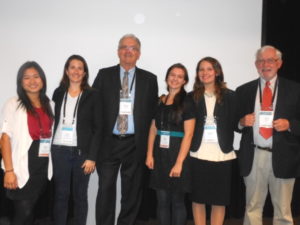

2014 Young Scholar: Jessica Bogard

Jessica Bogard
University of Queensland
Sponsored by the Queensland Committee
Jessica is a nutritionist and postgraduate research student at the School of Population Health at University of Queensland. Her research is looking at the contribution of fish to food and nutrition security in Bangladesh. Jessica is particularly interested in how agricultural systems can be evaluated more comprehensively, to include nutritional value, environmental sustainability and social impacts, in addition to traditional productivity and economic value measures.
Conference Report
… participation in the young agricultural scientist’s forum at the National Library and hearing about the careers of renowned scientists was not only engaging, but also incredibly motivating…”
The disconnect between the fields of agriculture and public health in addressing global food insecurity is something that has come to cause me great concern in my young career as a research scientist. To me, true collaboration across these sectors, in addition to the fields of environmental and social science, is the only way in which we will truly be able to feed the nine billion, well. For this reason, I have chosen to focus my research and career at the intersection of nutrition and agriculture. As a first step in this direction I believe that establishing a strong multidisciplinary network as an early career researcher is essential. This is something that I had hoped would be driven forward through participation in The Crawford Fund Annual Parliamentary Conference – a hope which I am pleased to say has certainly come to fruition.
Networking, not only with experienced scientists, but also with the newly established Researchers in Agriculture for International Development (RAID) group, for early career scientists, has been of enormous benefit. Secondly, participation in the young agricultural scientist’s forum at the National Library and hearing about the careers of renowned scientists was not only engaging, but also incredibly motivating. It was encouraging to hear about the varied careers paths in international agricultural research, including the challenges as well as the triumphs.
The stand out highlight of the conference for me was the Sir John Crawford Memorial Address by Professor Catherine Bertini. She gave a profound and engaging summary of the challenges to be addressed at the conference, and then was able to synthesise a concise list of key steps forward in advancing agricultural development and global food security. Her insightful emphasis on the role of women in agriculture I feel really shaped some of the discussions of the following day.
Another highlight were the two fantastic presentations we heard in the first session from Ms Rachel Kyte of the World Bank Group and Dr Shenggan Fan of the International Food Policy Research Institute. Ms Kyte spoke of the need for an integrated and wholistic approach to “climate smart agriculture”, emphasising the importance of ecosystems, biodiversity, nutrition, sustainable intensification and reduced food waste to meet the challenge of global food security in the face of climate change. Dr Fan spoke of the triple burden: under-nutrition, micronutrient deficiency and overweight and obesity, now affecting low-income countries, and not just of the moral obligation to act, but of the economic case for investing in nutrition. He gave an example of astounding economic returns, USD 34:1, for investment in interventions designed to reduce stunting and pointed to specific inefficient policies and practices that contribute to hunger and malnutrition including gender inequality and unsustainable resource use in agriculture.
The importance of considering nutrition as both a driver and an output of agricultural systems, that was evident throughout many of the presentations and panel discussions was a highlight for me, as it confirmed that this is a vital direction for agricultural research – one that I am committed too, and excited to embark upon in collaboration with my newly formed network of agricultural researchers, thanks to the Crawford Fund Scholars Program.